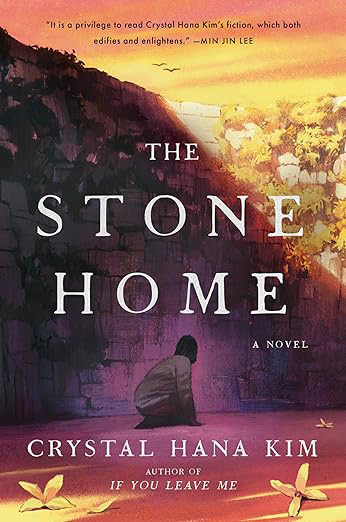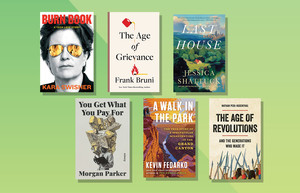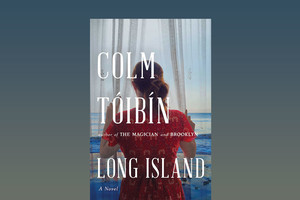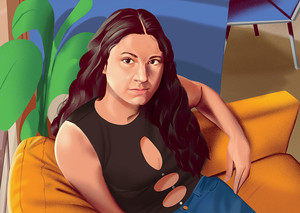During a period of military rule in the 1970s and 1980s, South Korean police and local officials sent thousands of people to “welfare facilities” under the pretense that they were “vagrants” who needed to be rehabilitated. In reality, the majority were kidnapped children and disabled adults, and those in charge of these internment camps subjected them to forced labor and abuse. These government-sponsored violations of human rights were in part tied to the country’s preparations to host the 1988 Summer Olympics, which would put South Korea on the world stage.
Novelist Crystal Hana Kim ’09CC, ’14SOA first learned of these atrocities from a 2016 Associated Press investigation of Brothers Home, the most notorious facility. At the time, Kim was working on her debut novel, If You Leave Me, which is set during the Korean War. But she was haunted by Brothers Home, writing in an author’s note to her new novel, “Questions plagued me: What does it mean that state-sanctioned violence happens time and again? How do we confront our capacity for evil?”
That new book, The Stone Home, takes up these questions, bringing to life a horrific chapter of the past. The novel is informed by research, including an extensive interview with Han Jong-sun, a Brothers Home survivor and activist. But rather than attempt to faithfully tell the stories of Han and other victims, Kim uses fiction to explore the emotional terrain of what happened to detainees and how they were marked by their experiences.
The Stone Home opens in 2011, when forty-six-year-old Eunju Oh opens the door of her Daegu apartment to an unexpected visitor. Narae has come from New York to speak with Eunju at the suggestion of her father, Sangchul, who has just died. From 1980 to 1981, Eunju and Sangchul crossed paths at the Stone Home, a rehabilitation center that Kim models on Brothers Home. Eunju reluctantly takes on the task of exposing Narae to the long-buried truth of what happened at the Stone Home.
With this frame, Kim launches a dual-timeline, intergenerational story. For much of the novel, Eunju is plunged into the past, painfully reliving the year she and her mother spent interned at the Stone Home. Chapters alternate between Eunju’s first-person narration of her own experiences there and her third-person omniscient recounting of Sangchul’s story. Kim uses short interludes set in 2011 to give us a break from the harrowing intensity of both characters’ traumas and weave in historical context. As Eunju explains in one such section, the people sent away “were the vestiges of a country trying to reshape itself. It was easier not to see, to let us disappear.”
The brutality of the Stone Home is indeed difficult to confront. At the top of its hierarchy are Warden, a smarmy middle-aged man whose Christianity serves as a cover for his cruelty, and Teacher, a henchman who does no actual teaching. The facility is largely filled with “wayward boys,” but, as Warden explains, “we have space for the most vagrant women.” The boys — mostly teens like Sangchul and his older brother — are assigned to workshops where they produce goods for domestic and international sale. Meanwhile, Eunju and her mother join a small group of women and girls who spend most of their time locked in a kitchen, cooking meals that are insufficient to sate anyone’s hunger.
If the boys don’t meet each day’s production quota, Warden lashes them. But physical abuse is also doled out randomly. Teacher frequently erupts and attacks anyone in his path, and appointed “Keepers” — slightly older teens who were once “wayward” themselves — are all too ready to beat and rape their peers, “sucking satisfaction from these small acts of power.” Kim’s descriptions of violence are at times hard to read, but they never feel gratuitous. Each assault is tied to the novel’s exploration of the intoxicating effects of power, how easily it is abused, and how quickly we accept its crooked logic.
Over the course of the novel, Eunju and Sangchul must each determine how to make it out alive without accepting their disempowerment. The two recognize the worst of themselves in one another: a quick temper, selfishness, a tendency to compete rather than collaborate. While Eunju never loses sight of her mission — plotting an escape for herself and her mother — Sangchul gradually becomes more concerned with eking out an existence within the nightmare that Warden has constructed, with or without his brother.
Ultimately, they both must learn to trust their fellow inmates — and one another — in order to survive. Kim thus tempers the tale’s bleakness with a reminder that the human spirit can find ways to survive under the worst of circumstances. Solidarity brings not only greater strength but also justice, reconciliation, and hope for the future.



